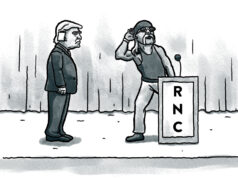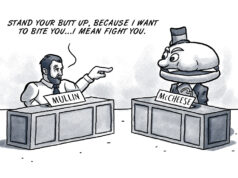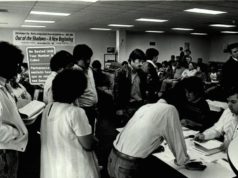

Oklahoma voters broke the state’s turnout record Tuesday, defied some political poll predictions and selected candidates that aren’t leading their parties’ primaries nationally.
The results appeared to solidify Oklahoma’s standing as a polar political state, buoyed on the right by conservative conservatives and on the left by liberal liberals — to the tune of more than 786,000 total votes cast.
Sanders populism translates to a win

On the Democratic side, Vermont Sen. Bernie Sanders’s populist and trust-busting rhetoric found receptive ears at two huge rallies heading up to Super Tuesday.
Sanders received 174,054 votes and 21 delegates, according to Politico, while Clinton received 139,338 votes and 17 delegates. Former Maryland Gov. Martin O’Malley received 7,669 votes, despite dropping out of the race exactly one month earlier after a poor showing in Iowa. Four other candidates with no name recognition received more than 14,000 votes.
A majority of polls had shown Clinton clinging to a small lead in Oklahoma, but Sanders’ appeal may have broken the turnout model by the look of his margin of victory.
Cruz wins with potential home-field advantage

While Oklahoma Democrats threw their majority support behind the party’s non-establishment firebrand reformer, Oklahoma Republicans also denied its establishment a victory for increasingly-preferred candidate Sen. Marco Rubio (R-Florida).
Instead, Okies voted for a Texan: Sen. Ted Cruz, who finished with 157,941 votes and 14 delegates.
Despite receiving the endorsement of tea-party-favorite and former Oklahoma Sen. Tom Coburn, Rubio finished third with 119,562 votes and 11 delegates. The man who will continue to stand between Cruz and Rubio on GOP debate stages — Donald Trump — came in second with 130,141 votes and 12 delegates.
While Trump won contests Tuesday in Alabama, Arkansas, Georgia, Massachusetts, Tennessee, Vermont and Virginia, he couldn’t hold what polls showed to be a double-digit lead in the Sooner State.
Cruz, however, may have had a home-field advantage when it came to his campaign’s turnout operation. Longtime Oklahoma pollster and campaign man Chris Wilson is Cruz’s “technology manager,” and on Feb. 9 he told Reason.com a little about his strategies:
Chris Wilson told us that the campaign will then do “whatever it takes. We go to their house. We’ll bug them until they either turn out to vote or get a restraining order against us.”
“Restraining order” is a joke, but his volunteers do carry phone apps that even tell them what questions to ask occupants depending on whether a man or a woman answers the door.
Today, all campaigns buy data from marketers. Ekins explains that “companies amass enormous amounts of data based on transactions that you and I make—whether we opened a store loyalty card, whether we subscribed to a magazine.”
That data tells them something about how you think. Wilson told me, “Someone who buys arugula, we’ve found that they tend to be a little bit more Democratic—someone who buys iceberg lettuce tends to be more Republican.”
While Trump’s train in Oklahoma phone banked regularly through Super Tuesday, it may not have had such sophisticated salad-preference data, and it may have had a hard time reaching voters with certain GOTV efforts.
For instance, a YouTube video of Ivanka Trump urging Oklahomans to vote for her father uploaded Sunday had only 119 views by about 1 p.m. on election day. While it now has upwards of 740, the targeted social media piece certainly did not go viral.
Sanders wins 75 Oklahoma counties; Cruz wins Texas
Sanders and Cruz both needed their Oklahoma victories to help keep their campaigns afloat with moderate momentum. On a night that saw Clinton and Trump increase their national leads in total delegates and states won, Sanders received the most votes of any candidate — D or R — in the Sooner State.
Cruz, meanwhile, united the Red River Republican Rivalry by winning big in Texas. (He received almost 500,000 more votes than Trump in the state; and 732,000 more than Rubio.) Cruz also edged Trump in Alaska, while Rubio won his first state of the primary election in Minnesota.
Nuts and bolts
Sanders — and record-setting Democratic primary turnout as a whole — may have benefited from independents’ first opportunity to vote in primaries on the big-tent-party’s side. The self-described “democratic socialist” won 75 of Oklahoma’s 77 counties, losing only in Oklahoma County and Osage County to Clinton.
Ironically, Clinton has raised more money in Oklahoma than all other presidential candidates combined, as reported by Oklahoma Watch before the election.
Five states and the territory of Puerto Rico are set to hold caucuses or elections for at least one of the two major parties this weekend.




















